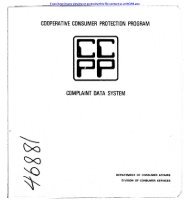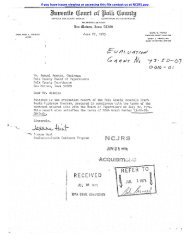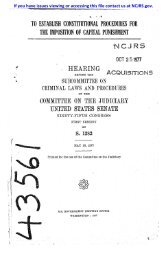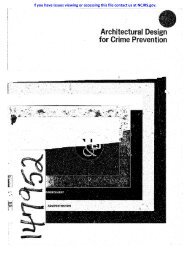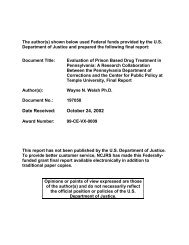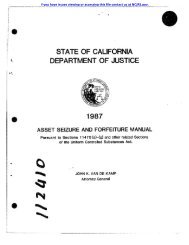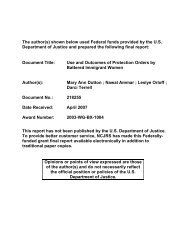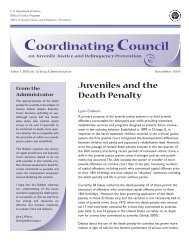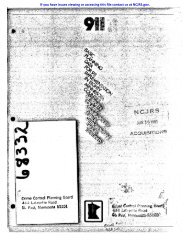Conflict Resolution Education - National Criminal Justice Reference ...
Conflict Resolution Education - National Criminal Justice Reference ...
Conflict Resolution Education - National Criminal Justice Reference ...
You also want an ePaper? Increase the reach of your titles
YUMPU automatically turns print PDFs into web optimized ePapers that Google loves.
♦ Mentoring at-risk youth. Every child needs at<br />
least one adult who provides unconditional love.<br />
Many children suffer from attention deprivation.<br />
When parents are unable or unavailable to provide<br />
the consistent nurturing and support that<br />
children need, mentors can have a profound<br />
impact in fulfilling that role.<br />
♦ Mentoring and training parents. Since much<br />
early antisocial behavior is caused by inconsistent<br />
and harsh discipline, parent training curriculums<br />
are important tools for breaking cycles of coercion<br />
(abuse and/or violence) and instilling positive<br />
parent-child interactions.<br />
♦ Targeting bullies. Peer harassment is an early<br />
indicator of lifelong antisocial problems. Without<br />
intervention, childhood bullies often develop into<br />
violent adults.<br />
Educating parents in conflict resolution is a natural<br />
way to bring children’s experiences at home and<br />
at school closer together. Helping families deal constructively<br />
with the inevitable conflicts of family<br />
living allows parents to disengage from inconsistent<br />
and harsh, punitive behaviors. When parents model<br />
effective behaviors in conflict situations, they present<br />
powerful teaching examples to children. In their<br />
book, Battles, Hassles, Tantrums & Tears, Beekman<br />
and Holmes offer parents strategies for coping with<br />
conflict and making peace at home. 5 Their program,<br />
C.H.O.I.C.E.S. for Managing <strong>Conflict</strong>, offers guidelines<br />
for adult responses to conflict (see figure 5).<br />
Although vital to early childhood education, parent<br />
initiatives are a potential link between schools and<br />
homes, regardless of the age of the youth involved.<br />
The more youth experience constructive approaches<br />
to conflict, especially at school or at home, the more<br />
likely they will internalize these behaviors.<br />
Parents as Teachers Program. Most early childhood<br />
education programs include parent involvement<br />
and parent education components for intervening<br />
in behaviors that promote a cycle of violence. The<br />
Parents as Teachers program, which originated in<br />
St. Louis, Missouri, is based on the idea that early<br />
childhood experiences are critical in laying the foundation<br />
for success in school and life, and that parents<br />
are children’s first and most influential teachers.<br />
54<br />
Parents as Teachers is a home-school-community<br />
partnership designed to provide parents with information<br />
and support in the development of prosocial<br />
skills. The goal is to help parents prepare their children<br />
for success in school and life throughout the<br />
critical years from birth to entry into kindergarten.<br />
Through personal home visits by child development<br />
professionals, group meetings with other parents,<br />
and play groups for parents and children together,<br />
parents are given alternatives to corporal punishment<br />
along with developmental information that<br />
promotes realistic expectations for their children’s<br />
behavior. This program provides a foundation of<br />
sharing, empathy, and accountability in young<br />
children that prepares them for conflict resolution<br />
education when they are older.<br />
Parents Anonymous, Inc. Recognizing the link<br />
between child abuse and juvenile delinquency, the<br />
Office of Juvenile <strong>Justice</strong> and Delinquency Prevention<br />
(OJJDP) began to support Parents Anonymous,<br />
Inc. (PA), in 1994. Because minority children<br />
are overrepresented in the juvenile justice system,<br />
this collaborative effort between OJJDP and PA<br />
focuses on bringing PA’s comprehensive model of<br />
neighborhood-based, shared leadership to families<br />
in low-income, high-crime areas. This national initiative<br />
is being implemented in 11 States by PA organizations<br />
dedicated to serving a range of ethnic<br />
groups, including Native Americans, African Americans,<br />
Asians, Latinos, and Appalachians.<br />
<strong>Conflict</strong> resolution is one of the elements of PA’s<br />
multifaceted program. Parents are given the opportunity<br />
to observe, practice, and learn conflict resolution<br />
skills and problem-solving processes. These<br />
skills and processes are taught in the context of<br />
family life, the worksite, and personal friendships.<br />
They are practiced in weekly group sessions as<br />
conflicts occur.<br />
Franklin Mediation Services and Head Start of<br />
Franklin County, Massachusetts. These two agencies<br />
joined to create a project providing comprehensive<br />
direct services in the form of mediation, parent<br />
and staff mediation training, and bias awareness<br />
training. Parents of Head Start pupils, Head Start<br />
staff, and community residents attend workshops<br />
to learn conflict resolution techniques. In addition,<br />
Head Start clients receive direct mediation services



